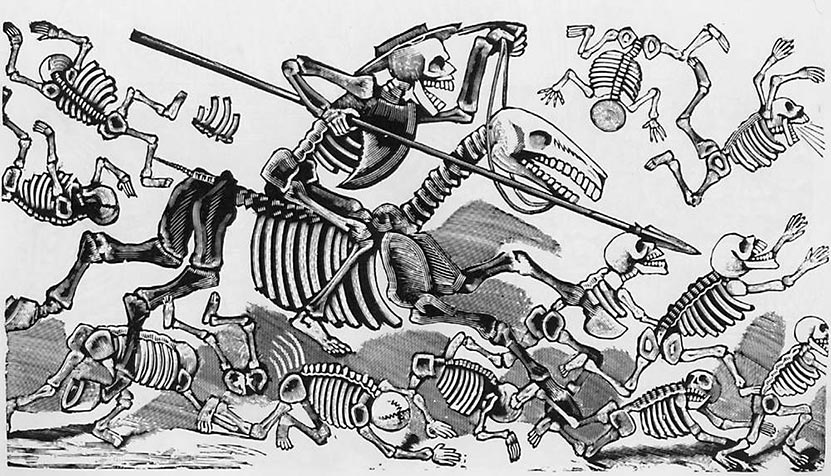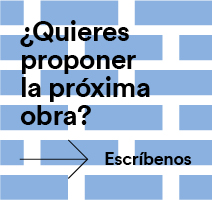Read
Radiohead, Juan Ramón, Cervantes - Distinto
Letting yourself be conquered by a better world: why is Don Quixote more successful than Radiohead's "Creep" or any other vindictive freak?
"If you are discovered by equals, flee to me, come to me".

"Goodbye Don Quixote!"
Don Quixote, Dulcinea, Sancho Panza.
Metal sculpture by artist Carlos Alberto Regazzoni.
City of Azul, Province of Buenos Aires, Argentina.
Flickr https:flickr
"Distinct".
They wanted to kill him
the equals,
because he was different.
If you see a different bird,
throw it away;
if you see a different mountain,
fall it down;
if you see a different road,
cut it;
if you see a different rose,
pluck it;
if you see a different river,
blind it...
if you see a different man,
kill him.
And the sun and the moon
giving in the different?
Height, scent, length, freshness, singing, living
different
of what is different;
what you are, what you are
different
(mountain, road, rose, river, bird, man):
if you are discovered by equals,
flee to me,
come to my being, my forehead, my different heart.
When Borja (Lit. y Escritura Creativa + speech Audiovisual) showed us this poem by Juan Ramón Jiménez, we started rambling about what it means to be different. Of course, talking about the different and misunderstood, Quixote almost always comes up somewhere. In search of a connection (to see if the poet had the great Caballero in mind), we found a video of the reading of the poem by an actor. So Borja came up with the idea of putting together a simple video to show us how perfect the Knight of the Sad Figure looks with the reading of the poem off-screen. There we saw that the silhouettes of the Hidalgo and his faithful squire, being such powerful literary characters, do not enrich the poem, but rather take it over, giving it a very specific direction towards the figure of Don Quixote. The Hidalgo thus becomes the "reader" of the poem and gives it his own form. This is the humble craftsmanship of our Borja:
Being a solitary and misunderstood hero par excellence, the Knight has infected his madness to the very fact of being different in a heroic core topic . Does this mean that being different implies a certain "madness" in the eyes of "the equals"? And what is this "madness" of Quixote like?
I don't know if many people know that "differentiation" is what constitutes today's world of sales and promotion. If something is not different from the rest, nobody will buy it. It is a marketing principle (written as it is) that has turned what is different around, giving it a price and cultivating it from commercial needs.
(here the following come to mind
Charlot and the Chaplinities
from article that we published
a fortnight ago)
In this sense, the "madness" of Don Quixote today could be a commercial bombshell: it is fashionable to be weird, geeky, characterful and weirdo, to the point that a derogatory term has emerged in English to refer to normal people, the normies. Thus, being "a little bit crazy" in many social spheres has become equivalent to "developing one's own brand" or, in other words, "selling oneself".
The driving force of "my worth is measured by public opinion" is well reflected in Radiohead's legendary song Creep. The lyrics convey a perfect despair at not "measuring up" to others who are so perfect and special. Back in 1992, there was already talk of "what do I do if I'm ugly and I like things that other people don't like". Eventually the song became an anthem for the "rejects" or those who thought they were "rejects".
You float like a feather
In a beautiful world
I wish I was special
You're so fuckin' special
But I'm a creep, I'm a weirdo
What the hell am I doing here?
I don't belong here. [1]
The #1 comment on YouTube of the official video,
made 4 years ago, has 6730 likes.
It says: "I don't belong here. - Story of my life".
Being different is one of the constant themes in art. There has always been an I/he as opposed to them. However, if contemporary fashion is based on a kind of vindication of one's own value, we believe that the case of Don Quixote is different.
To begin with, Alonso Quijano had no need for acceptance by society. He knew very well what he was: a knight-errant destined to save the world. From his perspective there was no conflict of non-understanding.
Can any of us really know what it is with such clarity? We all sense that we are something. Or at least that we function in one way or another: I am irascible, I am meek, I like red lollipops better than yellow ones, and so on. This is how we define ourselves and, therefore, distinguish ourselves.
But I'm not the only crack who likes red lollipops; I'm not out of the ordinary for watching films in the original with subtitles either. In the end, whether you like it or not, many of us share a lot. Even if I go around the university campus dressed entirely in bright yellow (there have been cases), this may be nothing more than a mere statement of the need - which many restless people are tempted to feel - to be a character.
And while Radiohead's lyrical self grovels spitefully at the "perfect normies", and fashion claims a pleasurable "abnormality" in the face of boring, old, establishment normies, Quixote doesn't care. He's a knight-errant, isn't he beautiful?
The nobleman lived according to what he thought was right and good, without the need to "normalise" or "legalise" it. Because in his mind it was normal to want to save the world from monsters and ruffians. His "different" from ours differs in one important detail: he believed in what he was.
Thus, DQ - as we call him among friends - is presented to us (among many other interpretations) as a symbol of absolute confidence in himself and his cause: to defend the weak, to save the world, to love Dulcinea. Quite simply.
This cause absorbs him, transfigures him, in short, drives him mad, doesn't it?

"Don Quixote, shown as a skeleton".
José Guadalupe Posada (1852-1913)
Mexico
Our hero is out of his mind, of course. "Being out of it" also often refers to being in love, for example. Also the famous hard drug subject , "ecstasy", comes from ex (out) - stasis (to be). In other words, there are many forms of madness, the good ones and the not so good ones.
One of the professors of Philology Hispánica of the University of Navarra, Carlos Mata, in his beautiful literary blog describes a theory that has delighted us. According to him, for a madman, the hidalgo acted with too much logic and coherence. For example: before setting off on an adventure, the knight makes himself a cardboard helmet, test it with his sword and it breaks. He then reassembles it, reinforced with iron bars, but prefers not to try it any more (he was sure it was going to break, come on):
For some critics," says Don Carlos, "this very rational behaviour is sample that Don Quixote's madness is not such; this is the opinion, for example, of Gonzalo Torrente Ballester[2], who interprets this passage as the process of constructing a disguise necessary to start the game: Don Quixote would be a big boy playing at being a knight-errant".
We too prefer to think that, at heart, he was like a big boy. A child who really believes in a magical world, where Good fights against evil forces in armour. And the amazing thing is that, beating after beating, he wins. He wins precisely because he lets himself be won by a world where love is always pure and selfless and any good is rewarded even if he never asks for it. Sounds pretty cool. You'd like to think so. But I tell you one thing: many of us do (or try to, at least).
Alonso Quijano's unshakeable faith is what makes him truly different. And, mind you ( spoiler alert), little by little this belief spreads to the rest of "the equals". Now that I think of our humanistic madness, I also hope that it will infect the world. One day, I'm sure it will.

Text: Danila Andreev - Spanish Philologist (UNAV, 2019), publisher #BeBrave . Promoter of the idea and Video: Borja Hernández Máñez - 2nd year of Lit. and Creative Writing + 3rd year of speech Audiovisual. Good conversations: Jas Podhorski - 3rd year Philosophy. José Lacarra - 3rd year Literature and Creative Writing. Pilar López - Spanish Philologist (UNAV, 2019). |
[1] source: LyricFind. Songwriters: Albert Louis Hammond / Michael Edward Hazlewood / Thomas Edward Yorke / Colin Charles Greenwood / Jonathan Richard Guy Greenwood / Edward John O'Brien / Philip James Selway. Creep lyrics © Warner Chappell Music, Inc, Peermusic Publishing. Creep' is taken from 'Pablo Honey' out on XL Recordings.
Buy & stream it here: https://radiohead.ffm.to/pablohoney
[2] Gonzalo Torrente Ballester, El "Quijote" como juego y otros trabajos críticos, Barcelona, Destino, 1984. Buy on Amazon.
Don Quijote de la Mancha, RAE and ASALE commemorative collection on Amazon, buy.






